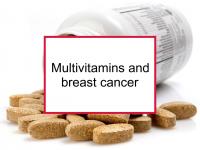Many women take multivitamins to maintain or improve health. Since oxidative stress plays a role in the development of many cancers, it is plausible that antioxidants might reduce cancer risk. The current page summarizes data concerning whether multivitamin supplements may be beneficial for those with breast cancer.
Breast cancer and multivitamins use
To investigate this question, we first examined the premise that taking multivitamins promotes good health in the general population. Based on the available evidence, multivitamin use might slow cognitive aging but does not appear to reduce risks of developing cardiovascular disease, most cancers, or premature death from any cause:
- A 2025 study of 950 men and women older than 60 reported slower aging in those taking multivitamins compared to the placebo group, based on epigenetic clocks.
- A 2024 study of 390,124 generally healthy adults with over 20 years of follow-up reported that daily multivitamin use was not associated with a mortality benefit.
- A 2023 analysis of data concerning 15,936 male and 7026 female cancer survivors reported that multivitamin use was not linked to improved all-cause mortality in the survivors overall.
- One large prospective study that included 489,640 participants in the NIH–AARP Diet and Health Study reported that, among women, daily multivitamin use was inversely associated with colon cancer risk whereas taking more than one multivitamin per day was linked to increased risk of oropharyngeal cancer. Multivitamin use was not associated with any other cancer types in women.
- A prospective study including 161,808 postmenopausal women in the Women's Health Initiative clinical trials tallied cardiovascular disease events, various cancers, and deaths during eight years of follow up. Approximately 42% of the study participants used multivitamins. No associations were found between multivitamin use and the risk of cancer (including breast cancer), heart attacks, stroke, blood clots, or overall mortality.
- Another prospective study designed to investigate the associations between multivitamin/mineral supplement use and risk of premature death or cancer included 182,099 participants enrolled in the Multiethnic Cohort Study in Hawaii and California. Study participants averaged 60 years of age and were followed for an average of 11 years. No associations were found between multivitamin use and death (from any cause), cardiovascular disease, or cancer (including breast cancer).
- Still another prospective study that included 38,772 women in the Iowa Women's Health Study was designed to investigate the associations between the use of vitamin and mineral supplements and death from any cause in older women. The average age at baseline was 61.6 years. The women reported their supplement use at baseline and in 1997 and 2004 and were followed through year-end 2008. Use of multivitamins was found to be associated with a slight (6%) increase in risk of death compared with nonuse.
Do multivitamins help prevent breast cancer?
Generally speaking, most studies have found no association between multivitamin use and breast cancer risk. One large meta-analysis of previous studies concluded that multivitamin use is likely not associated with a significant increased or decreased risk of breast cancer.
On the other hand, a Swedish prospective study reported that multivitamin use was associated with increased risk of breast cancer. The study included 35,329 initially cancer-free women in the Swedish Mammography Cohort who were followed for an average of 9.5 years. Taking multivitamins was found to be associated with a 19% increased risk of breast cancer compared to no multivitamin use. The association between breast cancer risk and multivitamin use did not differ significantly by hormone receptor status of the cancer.
Do multivitamins help prevent breast cancer recurrence?
The findings as to whether multivitamins help prevent breast cancer recurrence are mixed but point to a possible survival advantage:
- A 2025 Danish study reported that women with breast cancer may benefit to a small degree from multivitamin use, but should avoid disproportionate supplement intake, in particular antioxidant supplements during chemotherapy.
- A 2023 analysis of data concerning participants in the NIH-AARP Diet and Health Study found that multivitamin use was associated with a lower risk of cancer-specific mortality in survivors of breast cancer.
- A 2021 meta-analysis of previous studies reported that supplementation with multivitamins was associated with lower cancer recurrence among breast cancer survivors.
- A 2019 German study reported that postmenopausal women taking antioxidant supplements during radiotherapy and/or chemotherapy experienced worse recurrence-free survival and higher overall mortality than those not taking such supplements. The findings did not extend to women who took both antioxidants and other supplements after diagnosis
- A major 2013 U.S. study of participants in the Women’s Health Initiative reported that postmenopausal women with invasive breast cancer who took multivitamins with minerals had a lower risk of breast cancer-specific death than those who did not.
Bottom line
Based on the limited available evidence, regular (but not excessive) multivitamin use might help prevent breast cancer recurrence. Antioxidant (e.g., vitamin A, vitamin C, vitamin E) use during radiotherapy or chemotherapy has the potential to promote recurrence.
Sources of information provided in this webpage
The information above, which is updated continually as new research becomes available, has been developed based solely on the results of academic studies. Clicking on any of the underlined words will take you to its tag or webpage, which contain more extensive information.
Below are links to 20 studies concerning multivitamins and breast cancer. For a more complete list of studies, please click on multivitamins.
